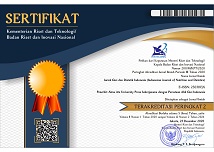Status gizi, kadar hemoglobin, ureum, dan kreatinin pasien konseling gizi hemodialisa
Abstract
ABSTRACT
Background : Patients who are undergoing hemodialysis therapy must know which foods that may be consumed including foods containing animal protein, low potassium, and low salt. The role of nutritionists is needed to provide nutritional counseling related to dietary adjustment. Studies that have been conducted by previous researchers are about diet from hemodialysis patients and the various factors that affect dietary compliance of patients, but no one has been studying the relation related to nutritional status, hemoglobin, ureum, and creatinine levels before and after doing a counseling that also has a relationship with diet and dietary compliance for hemodialysis patients.
Objectives : To analyze the relationship of nutritional status, hemoglobin, ureum, and creatinine levels of hemodialysis patients before and after doing nutritional counseling in RSUD Ungaran.
Methods : The study used a descriptive quantitaive method with one group pretest posttest design with cross sectional approach. The research was conducted in Hemodialysis Unit of RSUD Ungaran with a total sampling of 30 hemodialysis patient. Primary data were obtained from respondent’s data entry and FFQ, observation, and interviews. Secondary data were obtained from respondent’s medical records include the level of hemoglobin, urea, and cretinine. Data were analyzed using SPSS programme with Paired t Test.
Results : The results of SPSS analysis showed that probability value from urea men 0,016 < 0,05 and urea women – hemoglobin men and women – creatinin men and women overall 0,000 < 0,05, which means that the average levels of those components before and after doing a nutritional counseling is different.
Conclusions : A nutritional counseling indicate any change in the nutritional status of the entire hemodialysis patients, based on hemoglobin levels increased, while urea and creatinine levels decreased; but all those components are not in the normal category. Levels of hemoglobin, urea, and creatinine is changed within a period of one month after the implementation of individual nutritional counseling. It indicates that nutritional counseling efforts were given has a positive benefit for the patients to gain knowledge about dietary adjustments and implement the recommended diet in order to optimize the work of renal function excessively.
KEYWORDS : nutritional status, hemodialysis, eating behavior, nutritional counselingKeywords
Full Text:
PDFReferences
Davids MR. Chronic kidney disease – the silent epidemic. Chronic kidney disease brings a huge burden of premature death. Contin Med Educ. 2007;25(8):378.
Snyder JJ, Foley RN, Collins AJ. Prevalence of CKD in the United States: a sensitivity analysis using the National Health and Nutrition Examination Survey (NHANES) 1999-2004. Am J Kidney Dis. 2009;53(2):218–28.
Firmansyah MA. Usaha memperlambat perburukan penyakit ginjal kronik ke penyakit ginjal stadium akhir. Cermin Dunia Kedokt. 2010;37(3):181–5.
Badan Penelitian dan Pengembangan Kesehatan Departemen Kesehatan. Laporan nasional riset kesehatan dasar (RISKESDAS) tahun 2010. Jakarta; 2010.
K S. Buku ajar ilmu penyakit dalam, jilid II edisi V. Jakarta: FKUI; 2010.
Muttaqin A, Sari K. Asuhan keperawatan gangguan perkemihan. Jakarta: Salemba Medika; 2011.
Locatelli F, Fouque D, Heimburger O, Drüeke TB, Cannata-Andía JB, Hörl WH, et al. Nutritional status in dialysis patients: a European consensus. Nephrol Dial Transplant. 2002;17(4):563–72.
Denhaerynck K, Manhaeve D, Dobbels F, Garzoni D, Nolte C, De Geest S. Prevalence and consequences of nonadherence to hemodialysis regimens. Am J Crit Care [Internet]. American Association of Critical Care Nurses; 2007 [cited 2016 Dec 1];16(3):222–35. Available from: http://m.ajcc.aacnjournals.org/cgi/reprintframed/16/3/222/
Supariasa, Bachyar B, Ibnu F. Penilaian status gizi. Jakarta: EGC Buku Kedokteran; 2001. 17-54 p.
Ma ’shumah N, Bintanah S, Handarsari E, Studi P, Fakultas G, Keperawatan I, et al. Hubungan asupan protein dengan kadar ureum, kreatinin, dan kadar hemoglobin darah pada penderita gagal ginjal kronik hemodialisa rawat jalan di RS Tugurejo, Semarang. J Gizi Univ Muhammadiyah Semarang. 2014;3(1):22–32.
Anggraeni AC. Asuhan gizi nutritional care process. Yogyakarta: Graha Ilmu; 2012.
Hidayat T, Istiadah N. Panduan lengkap menguasai SPSS 19 untuk mengolah data statistika penelitian. Yogyakarta: PT TransMedia; 2011.
Parsudi A. Ginjal dan hipertensi pada usia lanjut dalam geriatri ilmu kesehatan usia lanjut. Edisi 4. Jakarta: Penerbit FK-UI; 2009.
Sutedjo AY. Buku saku mengenal penyakit melalui hasil pemeriksaan laboratorium. Yogyakarta: Penerbit Amara Books; 2009.
Benez. Klasifikasi stadium gagal ginjal kronik pada pria yang menderita gagal ginjal kronik berdasarkan perhitungan laju filtrasi glomerulus di RSMH Palembang periode 1 Januari 2003 – 31 Desember 2004 [Internet]. 2006. Available from: http://faw.jurnalpenelitian.com.unair/jurnal/publication/index/20benez.htm
Smeltzer S., Bare B. Buku ajar keperawanan medial bedah, Edisi 3, Volume 2. Jakarta: EGC Buku Kedokteran; 2002.
Noer MS. Gagal ginjal kronik pada anak [Internet]. 2006 [cited 2017 Mar 29]. Available from: https://d2ncoem.files.wordpress.com/2010/09/ginjal.pdf
Alam S, Hadibroto I. Gagal Ginjal. Yogyakarta: Pt Gramedia Pustaka Utama; 2007.
Guyton H. Buku ajar fisiologi kedokteran. Edisi 9. Jakarta: EGC; 1997. 521 p.
Kugler C, Vlaminck H, Haverich A, Maes B. Nonadherence with diet and fluid restrictions among adults having hemodialysis. J Nurs Scholarsh an Off Publ Sigma Theta Tau Int Honor Soc Nurs. 2005;37(1):25–9.
Hudak, Gallo. Keperawatan kritis pendekatan holistik edisi VI. Jakarta: EGC; 2006.
DOI: http://dx.doi.org/10.21927/ijnd.2017.5(1).31-43
Refbacks
- There are currently no refbacks.

This work is licensed under a Creative Commons Attribution-ShareAlike 4.0 International License.
Indonesian Journal of Nutrition and Dietetics (IJND) indexed by:
 View My Stats
View My Stats



12.png)


























